Google's December Helpful Content Update, which began rolling out on December 5, 2022 and finished its rollout on January 12, 2023, is a major update to the company's Helpful Content System. This system is designed to promote content that is helpful and not written solely for SEO purposes. The update improves the system's classifier and expands language support for the update. As a result websites may see changes in their traffic and rankings based on the quality and helpfulness of their content. It is important for website owners to understand the update and its impact on their sites, as well as strategies for recovering from any negative effects.
The Dec. 2022 helpful content update was released Dec. 5, starting to become more visible today & will take about two weeks to fully roll out. It improves our classifier & works across content globally in all languages. Our help page explains more: https://t.co/MS7hbcBTsp
— Google Search Central (@googlesearchc) December 6, 2022
In this article:
Impact of the update on websites
The impact of the December Helpful Content Update on websites has been substantial. As we look back over the past few months, it is clear that many sites that experienced losses in traffic beginning in November or December have continued to see declines. It is my belief that the helpful content classifier is now actively working to identify pages that fail to promptly and effectively address the searcher's needs.
Marie's thoughts on the December Helpful Content Update
Updated February 20, 2023: In the last few weeks I have spent many hours either on Zoom calls or in developing my course (on improving site quality - see my contact page for the latest updates,) I have reviewed hundreds of pages that have suffered losses in Google rankings and traffic.
I have noticed an interesting pattern amongst sites impacted.
I describe it in detail in this twitter thread.
A quick thread for those experiencing traffic drops in the last month.
So many sites are seeing significant declines in Google rankings and traffic.
If you submitted your site for me to test my tool, first, ty! But secondly, I want to share why I have put the tool on hold... pic.twitter.com/d2zrQozvKd
— Marie Haynes (@Marie_Haynes) February 20, 2023
If you have experienced a decline in website traffic starting from early November (usually around Nov 3 or 15), December 5 (which marks the release of the helpful content update), or any other day after the update, I recommend attempting the following exercise:
- Analyze the pages that are currently ranking in positions that you have the potential to compete for. It can be particularly beneficial to identify pages that showed an improvement in rankings around the same time that your rankings decreased. A tool like Ahrefs can be used for this purpose.
- Adopt the perspective of a user who is conducting a search and seeking a swift response to a specific question.
- Conduct a comparison between your website's content and that of the pages that are currently ranking well. It is recommended to carry out this analysis on a mobile device since most searches are performed on mobile.
Based on my analysis, pages that effectively and promptly address the searcher's information needs tend to perform better.
Here is a simple illustration of what I am seeing:

Take note: I am not saying that ads are causing you to have a helpful content classifier placed on your site. Rather, here's what is important: Can a searcher really quickly navigate to the bit of your page that truly answers their question quickly?
A significant proportion of articles that have been "optimized for SEO" are replete with words that serve no purpose other than to appear relevant to search engines. For instance, a user who has asked, "how do I fix my lawn mower" does not require an explanation of "what is a lawn mower." Such additional words were included in the past to enhance the relevance of content to a user's query. While comprehensive content can be advantageous, it is not always the most beneficial. Google seeks to display searchers content that is pertinent and useful.
Many articles that have been optimized for search are filled with superfluous words designed to appear relevant to search engines. This has historically worked well. With Google's evolving ability to understand search queries using neural networks and deep learning, I believe content must be both relevant and helpful to rank well in search results. Today, Google aims to display searchers content that is pertinent and valuable, not just content that appears to be relevant based on keyword matching.
A searcher who has asked, "how do I fix my lawn mower" does not need to be taught "what is a lawn mower". Comprehensive content can be a good thing. But it is not always the most helpful thing. Google wants to show searchers content that is relevant and helpful.
Clarification: A common misconception is that the helpful content update pertains to AI-generated content.
The SEO community has held a notion that the helpful content update aimed to downgrade AI-generated content. Consequently, they were perplexed when Google released documentation stating that not only is AI-generated content acceptable, but it can also be a valuable tool to create content! Google's stance on AI-generated content is not adversarial; they do not intend to rank content that lacks quality. If AI is utilized to produce articles with minimal human editing or originality, it will not be viewed any differently than using a junior copywriter or an inexpensive article spinning service. What counts is that the end result is useful to people.
What Constitutes "Unhelpful Content" According to Google?
Here is what Google's documentation on the helpful content system says:
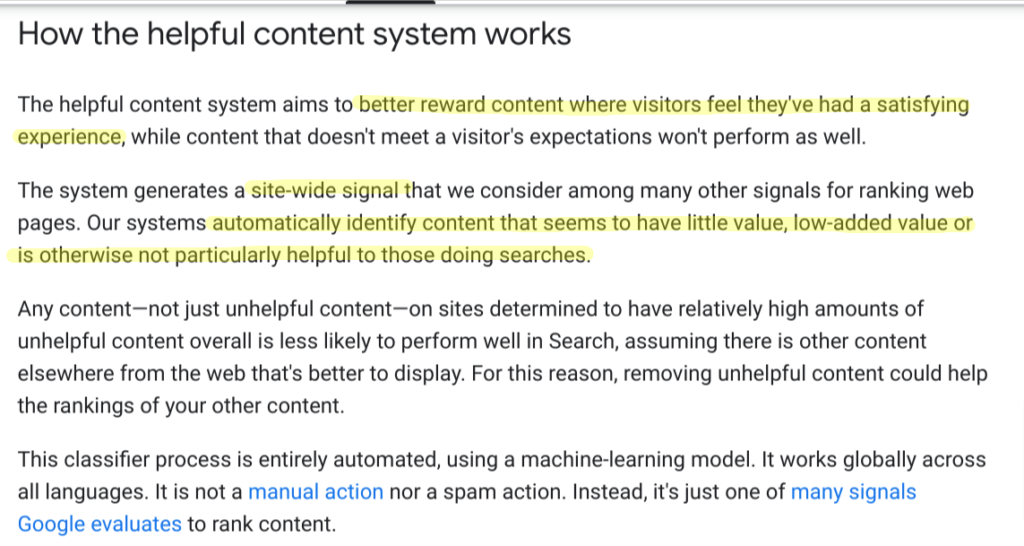
If your traffic has declined recently, I would urge you to consider either removing content that gets in the way of a searcher finding their answer, or, experiment with moving it further down the page.
What follows is the original article written on the December Helpful Content Update:
What changed with the December Helpful Content Update?
There are a number of factors that may have contributed to the losses seen by sites affected by the Helpful Content Update. The helpful content system is designed to promote content that is helpful and not content that was written only for SEO purposes. It remains to see which factors are important in the December rollout. I will know more once I have finished my analysis.
I'm currently studying sites sent to me so that I can share my thoughts on what Google has changed with this update.
The December Helpful Content Update (HCU) is likely to bring Google closer to accurately identifying and promoting content that is genuinely helpful and valuable to users. It is interesting to note that Google's Panda algorithm, which was introduced in 2011, was originally designed to discourage the creation of low-quality or spammy content that was created solely for the purpose of ranking well in search results. However, it took over a decade for Google to develop the AI-powered helpful content system, which is specifically designed to elevate content written by people for people. In this way, the HCU builds on the goals of Panda by using machine learning and artificial intelligence to identify and promote content that is truly helpful and valuable to users. By doing so, Google aims to provide more useful and relevant search results, and to discourage the creation of content that is solely focused on improving search rankings.
Here's what's new with this rollout:
- Now affects all languages globally (previously was just English)
- The system is updated with "additional signals to help Google identify more content created primarily for search engines versus people."
- With this update Google has improved the classifier they use to identify whether content is helpful.
Was AI generated content targeted?
In the first helpful content update, most of the sites impacted appeared to be using automation.
For example, one site that was affected was an aggregator of information around the web. They had thousands of pages filled with statistics and descriptions generated by AI. On the surface, one might think this content was helpful, but in reality, very few people would actually read it. The main reason for using AI to generate this content was to include keywords on the pages to make the content appear more relevant to search engines.
Google told us that the HCU is a machine learning model that is continually learning and improving. We can expect to see MUCH more from the HCU in months to come. It remains to be seen what the December 5 HCU will change, but most likely with each update Google will get a little better at ranking content that truly is created to help people.
Added Jan 13: Not all AI written content is low quality content. The well known site, BankRate caused quite a stir by openly stating their content was written by AI, and edited by humans.
Looks like @CNET (DR 92 tech site) just did their coming out about using AI content for SEO articles. pic.twitter.com/CR0IkgUUnq
— Gael Breton (@GaelBreton) January 11, 2023
This content does not appear to be affected by the helpful content update. This makes sense to me. Google is not against AI written content. They're against low quality content. It just happens that a lot of AI written content is low quality.
As said before when asked about AI, content created primarily for search engine rankings, however it is done, is against our guidance. If content is helpful & created for people first, that's not an issue.https://t.co/3rs3Yrrrk1https://t.co/TlFEbdXGAphttps://t.co/Yl9XWr5CAN pic.twitter.com/gFTE2C2wq1
— Google SearchLiaison (@searchliaison) January 12, 2023
Impact of the update on websites
Very early polls are showing that there is some impact. It is interesting to see that many are saying their traffic is up with this HCU. Previously, we saw sites hit and very few sites with obvious gains.
Super early HCU poll. Do you think you've been affected so far?
— Marie Haynes (@Marie_Haynes) December 7, 2022
Within 24 hours of the announcement of this update I already have several requests for help in my inbox. It does appear that this update will be significant. So far, as of December 29, the Semrush sensor has shown increased SERP turbulence on several days. I anticipate the end of this update -- when it finally happens -- will cause wild changes.
With the first HCU, most if not all of the sites I saw hit had been extensively using automation in order to produce words on pages that very few humans actually read.
Let's say you have a site that reviews automobiles. For each car, you've presented searchers with the important information they want to know, aggregated from sources around the internet. But, this is the same content that everyone else has. So, to make it appear relevant to search engines, you add some text..."BMW's 2023 8 series lineup offers some new features...", or "Here are some statistics on this model's sales around the US" perhaps.
While your content on this page may be unique, it is unlikely to be uniquely valuable to a searcher when compared with the information that could be found on BMW's own website.
I will update this post once I have thoroughly analysed sites impacted. It usually takes a few weeks following an update for me to feel confident in my assessment.
Tips for creating helpful content
Here are some questions to ask yourself about your content:
If you took out all of the content on your page that is simply regurgitating what others are saying, what is left?
Would a searcher find it helpful to read both your page and the pages that it summarizes?
In the past, a good SEO could craft content and build links to show Google's algorithms that content was more relevant and helpful than the original source. As Google's AI capabilities improve, so does their ability to recognize when content that is present on a page exists simply for search engines, or when content is there to educate a brand's existing audience.
Importance of first hand expertise and experience
It is no coincidence that Google added an extra E to E-A-T to now include evaluating experience as a sign of quality. Creating helpful content requires showcasing your unique experience.
Several of Google's helpful content questions are about first hand expertise or experience:
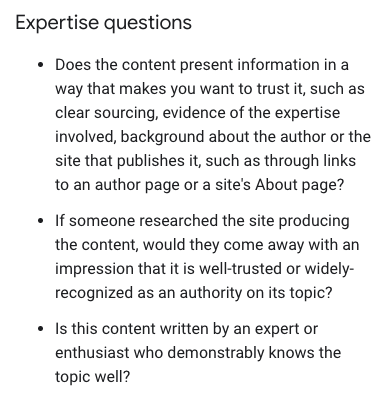
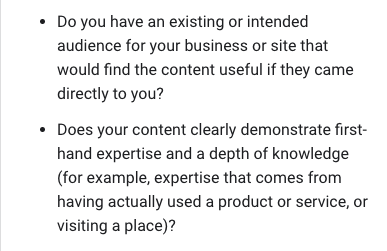

For an increasing number of queries, Google is now ranking content that comes from some type of place of first hand expertise. Does this mean that a chef writing an article reviewing blenders needs to personally use every single blender they review? No! What matters is that that chef is known as a chef -- as someone people recognize as being known for understanding what the characteristics of a good blender are.
Google's algorithms aim to prioritize content that is written from firsthand experience and expertise when answering a query. Their machine-learning algorithms can give more weight to this type of content as it is identified as helpful.
How can Google determine first hand experience or expertise? There are many signals Google could consider: (Note: I hope to have an article soon on how you can best demonstrate experience as described in the QRG.)
- Knowledge graph connections. If the KG shows that your authors or your brand have many connections to the topics you write on, this can demonstrate topical expertise.
- Topical expertise in your content. If you have a body of content that is helpful on a topic, this likely helps Google trust your expertise on a topic.
- How content is written. I can put content into an AI tool and ask the tool whether it is professionally written. It is usually correct. I'm sure Google can use AI to determine whether content is written with a firsthand perspective.
- What helpful resources you use including images, video and others. It's not going to hurt a page to use stock imagery, but I believe Google will soon reward pages that have unique imagery that demonstrates their expertise. If you are writing about rock tumbling...get some videos on your site of you demonstrating how you use rock tumblers.
- What others say. Google's Quality Raters' Guidelines repeatedly mention that what matters is what other experts on a topic have to say about you. How reputation is determined varies greatly for different topics. For a medical site, being recognized by other medical experts speaks to E-E-A-T. For a recipe site, popularity and being known for having good recipes may be more important.
It's worth noting that Google's algorithms are weighted, which means that authoritative sources like news articles may still be able to rank competitively against content written from firsthand experience.
Advice for demonstrating first-hand expertise and experience
First, have first hand expertise and experience!
If your goal is to determine how to demonstrate first hand expertise when none is actually present, you will have difficulty!
Will it help to add an expert author or expert reviewer? Perhaps. Adding quotes from experts can help. Not just any quote. Try to get quotes that truly make your content more helpful.
However, if Google's algorithms are heavily weighting expertise for your queries you may find that it is difficult to rank unless you can truly be known as THE place to go for information on a topic.
To demonstrate first hand expertise, you can get clues from Google's documentation on creating helpful content:
- Provide original reporting, research or analysis that a user would find helpful.
- Provide insight that is based on your experience.
- Brainstorm on how to make your content substantially more valuable by drawing on your expertise and data.
- Demonstrate your expertise using images and video.
How the HCU works
The helpful content system uses a machine learned algorithm that is constantly improving in order to help Google identify content that is helpful. The December 5 update represents an improvement to how Google detects unhelpful content.
If a website was negatively impacted by the December Helpful Content Update (HCU), it may be necessary to take steps to address any issues with the content on the site. This could involve removing unhelpful or low-quality content, as well as improving the way that helpful content is presented and organized on the site. Once these changes have been made, it may be necessary to wait for the helpful content classifier to recognize that the content on the site is now more helpful and valuable to users. This process could take some time, and it may be necessary to be patient while the classifier adjusts to the changes made to the site's content.
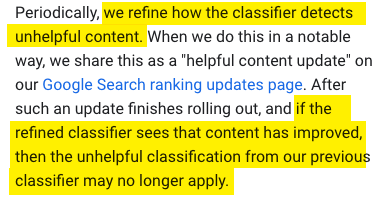
Recovery from a December HCU hit - how long will it take?
To recover you will need to identify why you were hit and then remove or greatly improve the offending content from your site. If you've been using AI to generate text to populate keywords on the page in an attempt to make them more relevant it may be worth considering removing some of this text. Better yet, add more text that is uniquely relevant and truly helpful when it comes to answering the searcher's fundamental need.
Once the "unhelpful" classification is placed on your site, Google's algorithms want to see not only that the unhelpful content has been removed, but that it has remained that way for several months.
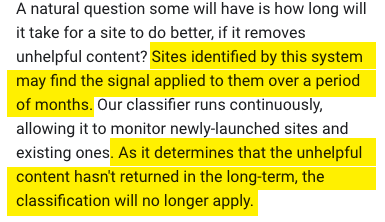
The helpful content system is continually running. If you were impacted by the December HCU I'd recommend thoroughly reading all of the following:
- Google's information on the helpful content system
- My article on the first HCU with loads of information on how it works and how to recover if hit
- My article on Search Engine Land with much more on understanding Google's HCU questions
- Google's guide on creating helpful content - including the helpful content questions
- My list of known and suspected Google updates
Danny Sullivan from Google clarified that if you were hit by the first HCU and have improved your site, you may see recovery with this update.
And if content is seen as unhelpful with the latest classifier, and improves after this update, the usual advice applies. After a period of time, if that actual improvement is seen to continue, the classification is dropped.
— Google SearchLiaison (@searchliaison) December 7, 2022
HCU recovery stories (coming soon)
I will report back as I hear of cases where sites have recovered from an Aug 25, 2022 helpful content update hit.
Professional help and assessment
Because the helpful content system is new, there are no SEO professionals who thoroughly understand how it works and how to recover. But there are many who stay abreast of what Google's algorithms are doing. I would be happy to recommend someone you can consult with.
My recommendations if you want to learn more
- Google's advice on assessing traffic drops
- My guide to assessing a drop in Google organic traffic
- My book on using the information in the Quality Raters Guidelines as a checklist for improving site quality. This is the 2020 version so the helpful content questions are not assessed in here. You can sign up to be notified when my 2023 book and course on Google's algorithms, E-A-T, the QRG and AI driven search algorithms are available.
- My newsletter where each week I write the latest important information on Google updates and system changes.
I am currently on a sabbatical from client work as I am working on my new book. However, I am analyzing sites hit by the December HCU so that I can better understand what Google is doing. While I can't promise you an answer, the more who submit information to help me the better I can advise people on recovery.
Update: I am creating a tool that will allow you to easily assess which update has hit you. I'll be testing it out on submitted sites (and I'll send you the results as well - no charge.)
Submit your site to help with Marie's research
You can use this form to submit your site and be notified once my tool is ready.
or
Use this form to sign up for my waiting list once I resume personally doing site reviews.
Newsletter signup
Every week I write a LOT to help website owners understand Google's rapidly changing algorithms. The basics of what you need to know are in the free version.
Or, for $18 you can sign up for the paid version where I share as much as I can to help us improve in the eyes of Google's algorithms.



Comments are closed.